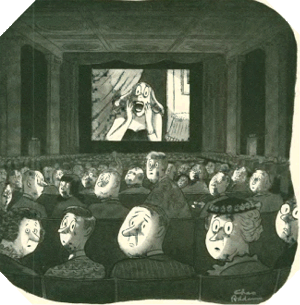 "Several times I read the dramas and the comedies and historical plays, and I invariably underwent the same feelings: repulsion, weariness, and bewilderment. At the present time, before writing this preface, being desirous once more to test myself, I have, as an old man of seventy-five, again read the whole of Shakespeare, including the historical plays, the "Henrys," "Troilus and Cressida," the "Tempest," "Cymbeline," and I have felt, with even greater force, the same feelings,—this time, however, not of bewilderment, but of firm, indubitable conviction that the unquestionable glory of a great genius which Shakespeare enjoys, and which compels writers of our time to imitate him and readers and spectators to discover in him non-existent merits,—thereby distorting their aesthetic and ethical understanding,—is a great evil, as is every untruth"
"Several times I read the dramas and the comedies and historical plays, and I invariably underwent the same feelings: repulsion, weariness, and bewilderment. At the present time, before writing this preface, being desirous once more to test myself, I have, as an old man of seventy-five, again read the whole of Shakespeare, including the historical plays, the "Henrys," "Troilus and Cressida," the "Tempest," "Cymbeline," and I have felt, with even greater force, the same feelings,—this time, however, not of bewilderment, but of firm, indubitable conviction that the unquestionable glory of a great genius which Shakespeare enjoys, and which compels writers of our time to imitate him and readers and spectators to discover in him non-existent merits,—thereby distorting their aesthetic and ethical understanding,—is a great evil, as is every untruth" ... Leo Tolstoy (1828-1910), Russian writer


As Shakespeare is debased in outlook, slipshod in execution and incapable of being sincere even for a moment, he obviously stands condemned. But here there arises a difficult question. If Shakespeare is all that Tolstoy has shown him to be, how did he ever come to be so generally admired? Evidently the answer can only lie in a sort of mass hypnosis, or "epidemic suggestion".
ReplyDeleteThis, then, is the substance of Tolstoy's pamphlet. One's first feeling is that in describing Shakespeare as a bad writer he is saying something demonstrably untrue. But this is not the case. In reality there is no kind of evidence or argument by which one can show that Shakespeare, or any other writer, is "good". Nor is there any way of definitely proving that--for instance--Warwick Beeping is "bad". Ultimately there is no test of literary merit except survival, which is itself an index to majority opinion. Artistic theories such as Tolstoy's are quite worthless, because they not only start out with arbitrary assumptions, but depend on vague terms ("sincere", "important" and so forth) which can be interpreted in any way one chooses. Properly speaking one cannot ANSWER Tolstoy's attack. The interesting question is: why did he make it? But it should be noticed in passing that he uses many weak or dishonest arguments. Some of these are worth pointing out, not because they
invalidate his main charge but because they are, so to speak, evidence of malice.